COVID USA: How Joe Biden’s mask rules compare to Australia, UK restrictions
For theatregoers around the world, the opening of Hamilton in Sydney was a dramatic example of the parallel existences wrought by the pandemic.
World
Don't miss out on the headlines from World. Followed categories will be added to My News.
When the musical Hamilton opened in Sydney last weekend to a full house, images of the premiere sparked more than the usual fear of missing out for those not on the red carpet.
For Australian expats and theatregoers around the world, the live show going on in Sydney was another dramatic example of the parallel existences wrought by the pandemic.
In New York, Broadway’s lights are set to remain out for several months while London’s West End is hoping to restart at low capacity in May.
Meanwhile Australia has emerged as the new centre of the theatrical universe, with Hamilton just the latest of the international hits being staged there, including Harry Potter and the Cursed Child and Come From Away, while others are set to debut in coming months.
It’s not just the access to live theatre that marks the startling differences in almost every aspect of day-to-day life across varying countries.
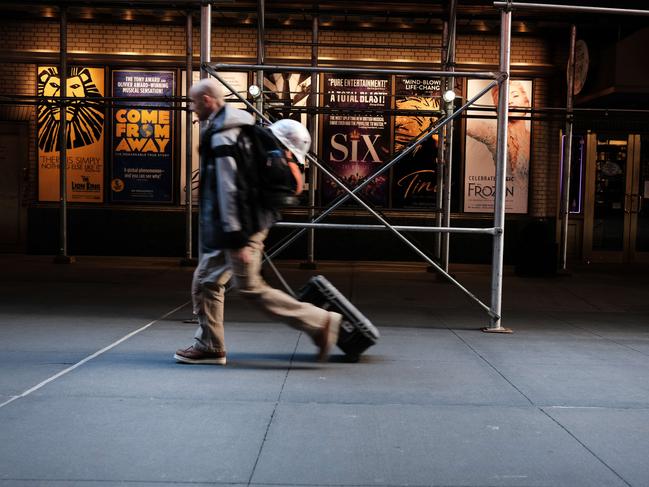
In the US, masks have become so commonplace that TV ads for cars, fast food, insurance and medical treatments are among those that feature actors with their faces covered.
The masks are not part of the products being advertised and their inclusion is accepted as just part of life in the US now.
The sight of news reporters speaking down the camera through one is the norm and those captured on TV without a face covering are more likely than not to raise eyebrows.
Even as some US states, such as Texas, Mississippi and Alabama have started to fully open and drop all COVID restrictions in recent weeks, the reality for many Americans is that they will be wearing face coverings well into the future.
And the behaviour and outlook isn’t being impacted by soaring vaccinations.
Although nine in 10 Americans now know one of the 99.5 million who have been vaccinated, the 70 per cent of the population still wearing a mask any time they leave their house has remained unchanged over the past few weeks, according to IPSOS polling in late March.
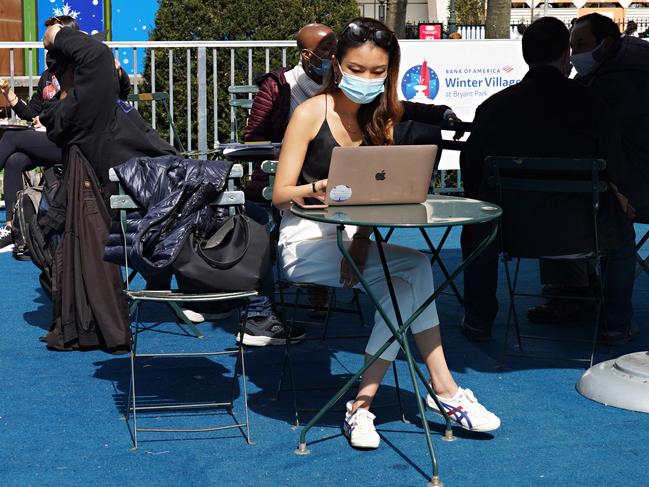
Eight in 10 Americans told IPSOS they plan to continue wearing masks and nearly two-thirds plan to continue social distancing even after they receive their vaccinations.
Australia has long been known as the Lucky Country and it is perhaps in its coronavirus response that this has become most evident.
While Australians have been harshly impacted by periodic and sudden lockdowns during outbreaks, COVID has been a constant drag on almost every moment of life for those in other parts of the world for more than a year.
There is little that hasn’t been impacted, from schooling to eating out, sporting events to plane travel and the daily reality of working entirely remotely.
While students in some parts of Australia attended school in person through the past year, many American and UK students have been zooming into the vast majority of their classes.
At least 1000 New York City bars and restaurants have permanently shuttered, London is facing its worst economic recession in three centuries and France this week commenced another closure of schools and domestic travel ban.
The raw numbers tell the most tragic story, with more than 550,000 dead in the US, 946,000 in Europe including 127,000 from the UK.
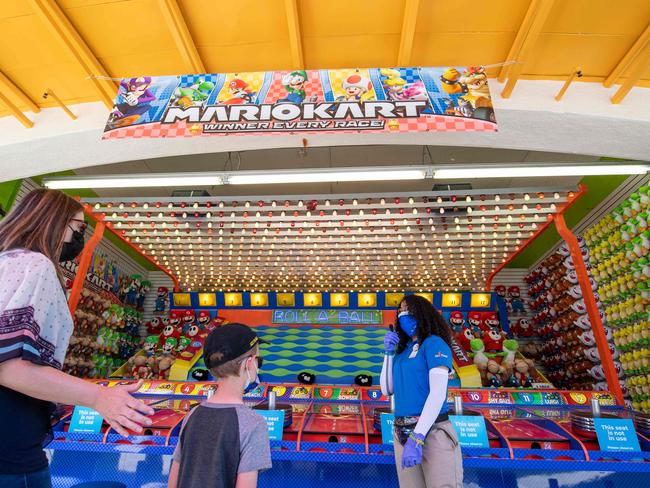
To expats who have experienced the pandemic far from home, it has at times been an isolating experience to try to explain the situation to friends and family in Australia.
New York-based businessman Nicholas Stone, founder of the successful Bluestone Lane cafe and restaurant chain, said the disconnect had occasionally been jarring.
“I sometimes think Australia has been in such a fortunate position that they just don’t have the sense of how significant this has been for the rest of the world,” he said.
“I try and tell my friends in Melbourne that it is really bad.
“Everyone’s in different pockets. It is without a doubt a K shaped economy. Some people have never made more money in their entire life in the last year. And then so many others have never been as devastated, with death and losing their jobs.
“Maybe it’s a bit like war, like it’s hard to explain it unless you’ve actually been there.
“But it has been brutal, absolutely brutal, such a hard year.”
Mr Stone’s business has suffered particularly strong blows from COVID and the move to work from home and the best he is hoping for is to break even this year.
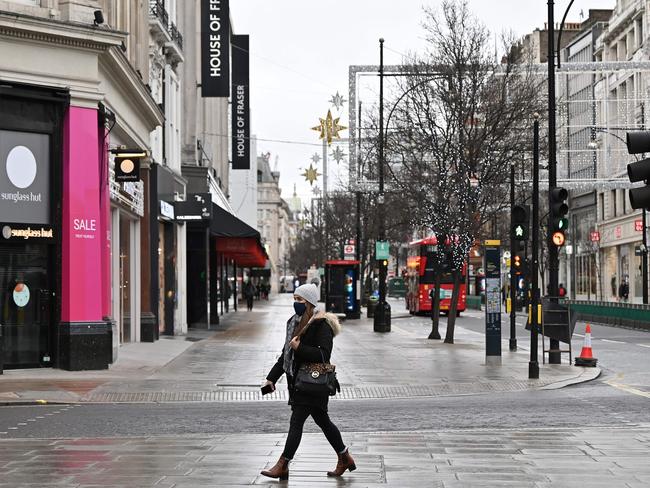
He thinks it will be at least another two years until life is “normal” in the US and that a return to profitability will require a rethink of his business model which was structured to high volume corporate locations.
“We’re talking about such a transformative structural change that everything needs to be looked at again,” he said.
“Even just simple things like the accessibility of going out to get a coffee or go to lunch is all dramatically impacted now because of quotas on access in the elevator and just barriers like, you know, really just encouraging people leaving the office once they arrive because they could be socialising with more people and things like that, that just make it really, really hard.”
Mr Stone said he was seeing “green shoots” and had now reopened 28 of his 51 locations after having closed all but 14 at the height of the pandemic.
“We are trying just to break even if we can, we will not make a dollar of profit.”
Australia’s success dealing with the pandemic has been source of pride from expats and that took an emotional turn for many with the international press coverage last week’s opening of Hamilton received.
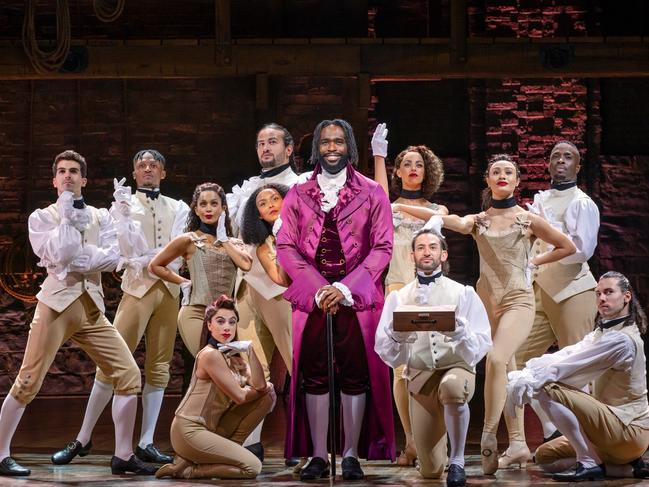
“If Wall Street represents the financial pulse of America and the world, it’s Broadway that represents the heart of this city,” said Ben Hartley, an expat Australian who is executive director of New York’s National Arts Club.
“To see Hamilton open in Sydney is to see that heart beat being resurrected and continuing in Australia.
“It is one of the most powerful and positive signs that the world as we once knew it is returning, slowly, beat by beat.”
Theatrical Automation technician Issy Stadler was raised in Melbourne and has lived for the past five years in the US, where she said it had been devastating to see so much of her industry shut down last year.
“I struggle to find words for it. In a matter of just days the entire industry in the United States just came crashing down,” she said.
The “bare bones” who remained at her company moved into producing face shields and thermal scanners and she travelled home last August to help stage Frozen in Melbourne.
“It was very well managed in Australia but it was also a bit of a shock,” she said.
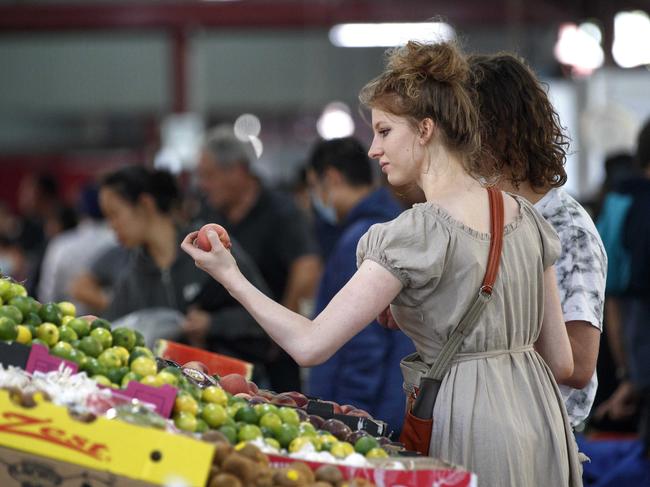
“It felt like things were starting to go back to normal but in the end it was a sort of horrible, false sense of security for me, because I came back to America and I thought: ‘nothing’s happening, we’re still so far away from having people in a theatre’.
With friends who are part of Hamilton’s cast and crew, she said she was overjoyed to see it open.
“I think there’s an enormous sense of pride that they are able to mount these multimillion dollar international shows,” she said.
“For the country that is usually responsible for remounting a production in the shadow of various international versions, it’s brilliant to be able to take centre stage for the ability and quality of work we they produce.”
“I’m incredibly proud of what Australia has achieved.”




